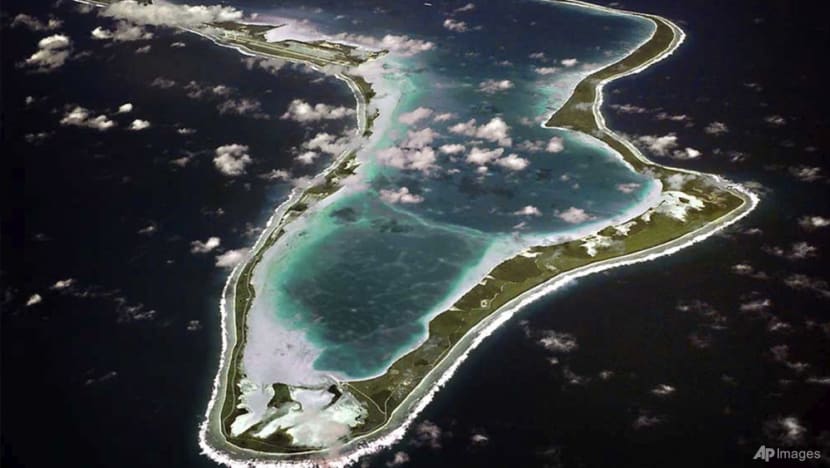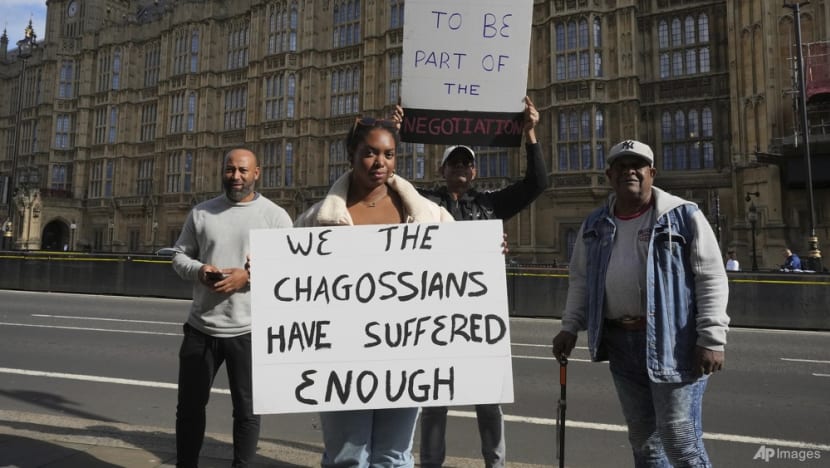‘It’s about our people’: Chagos Islands handover deal faces fresh opposition
Since an agreement for the United Kingdom to give up sovereignty of the islands was announced in October, Chagossians have voiced concerns that they were not given a say.


This audio is generated by an AI tool.
CRAWLEY, England: British Prime Minister Keir Starmer is facing another setback over the United Kingdom’s decision to give up sovereignty of the Chagos Islands and hand over the land to Mauritius.
In the Mauritian parliament on Tuesday (Dec 17), newly elected Prime Minister Navin Ramgoolam – who took office in November – said the deal his predecessor negotiated “would not produce the benefits the nation could expect”.
He added that he was reopening negotiations and issued "counterproposals" to the British government.
Chagossians were forced to leave their homeland in the 1960s and 1970s, after Britain bought the chain of more than 60 islands in the Indian Ocean and established a military base, which it leased to the United States.
Many Chagossians settled in the town of Crawley in southeast England, close to the nearby London Gatwick Airport, when the UK granted them citizenship in 2002.
Then in October, news broke about the deal over the strategically important cluster of islands, which would end a decades-long dispute at the United Nations.
“LIVING IN EXILE”
This led to pushback from islanders living in Crawley, who number a few thousand in total.
They voiced their concerns at a weekly meeting on Wednesday, saying they were not given a voice. Some have called for a referendum among their people scattered around the world to decide their own fate.
“It's not about the future of the British government or about the Mauritian government, about what's good for them. It's about our people,” said Frankie Bontemps, chair of Chagossian Voices - a community platform for the islands’ global diaspora.
“For the last 50 years, the Chagossian people have been living in exile … deprived of our culture, our way of life, of everything. So we should be at the center of everything, every decision, and we should be there to express our views and opinions,” he added.
Chagossians were initially deported to either Mauritius or the Seychelles where they say they still face systemic discrimination.
"When we were deported and forcibly dumped in Mauritius, there was no help that was given. They weren’t ready,” said Maxwell Evenor from Chagossian Voices.
“There was no resettlement support package or anything. Our people were just put in animal houses.”
When the agreement was annouced, David Lammy, the UK’s Secretary of State for Foreign, Commonwealth and Development Affairs, said the government “deeply regrets the way Chaogossians were removed from the islands and the way they were treated thereafter”.
Lammy also said Chagossian interests were “at the heart” of the deal.

Britain's opposition Conservative Party negotiated this agreement for years while in power.
But it is now critical of how the new Labour government has handled the issue, highlighting the negative reaction from Chagossians.
“It is absolutely crystal clear that they feel that their voices have not been heard by this government, that they're having no say on the future of what is their home – and that's what they want addressed,” Shadow Foreign Secretary Priti Patel told CNA.
HURDLES PERSIST
While Chagossians successfully fought for the right to become British citizens at the turn of the millennium, many say they would rather have the right to return home.
But the British government’s latest deal with Mauritius would allow them only to visit their homeland’s largest island, Diego Garcia, which is now a strategically important and operational British military outpost shared with the US.
Under the deal, Chagossians would also only be allowed to return to the outer islands.
The agreement faces other major hurdles.
US President-elect Donald Trump is reportedly against the deal, which would see Mauritius agreeing to lease the military base on Diego Garcia back to the UK for 99 years.
Questions have emerged over how much this would reduce London’s and Washington’s military autonomy on the island, as well as the power it would give Mauritius to have a say on operations there.
However, the UK government said it is confident that all sides will support the deal once the details are released.
“For the first time in 50 years, the base will be undisputed and legally secure,” said Luke Pollard, the UK’s Parliamentary Under-Secretary of State for the Armed Forces.
“Continued uncertainty would be a gift to our adversaries. That is why the agreement has been welcomed by all parts of the US system, and other critical regional security partners.”
The deal is subject to the finalisation of a treaty, with the plan to present it to the UK parliament next year.














